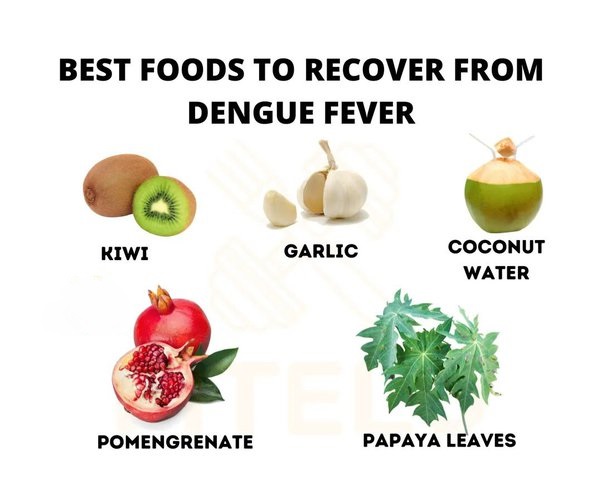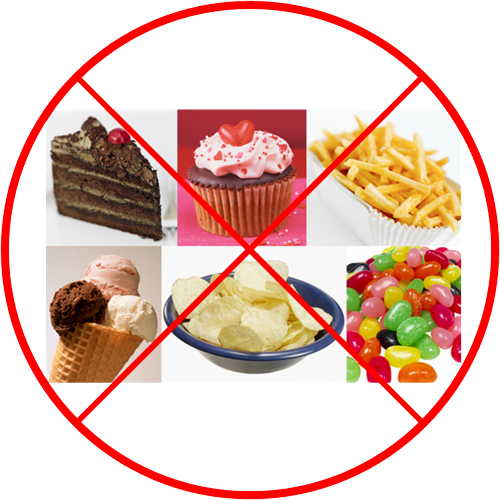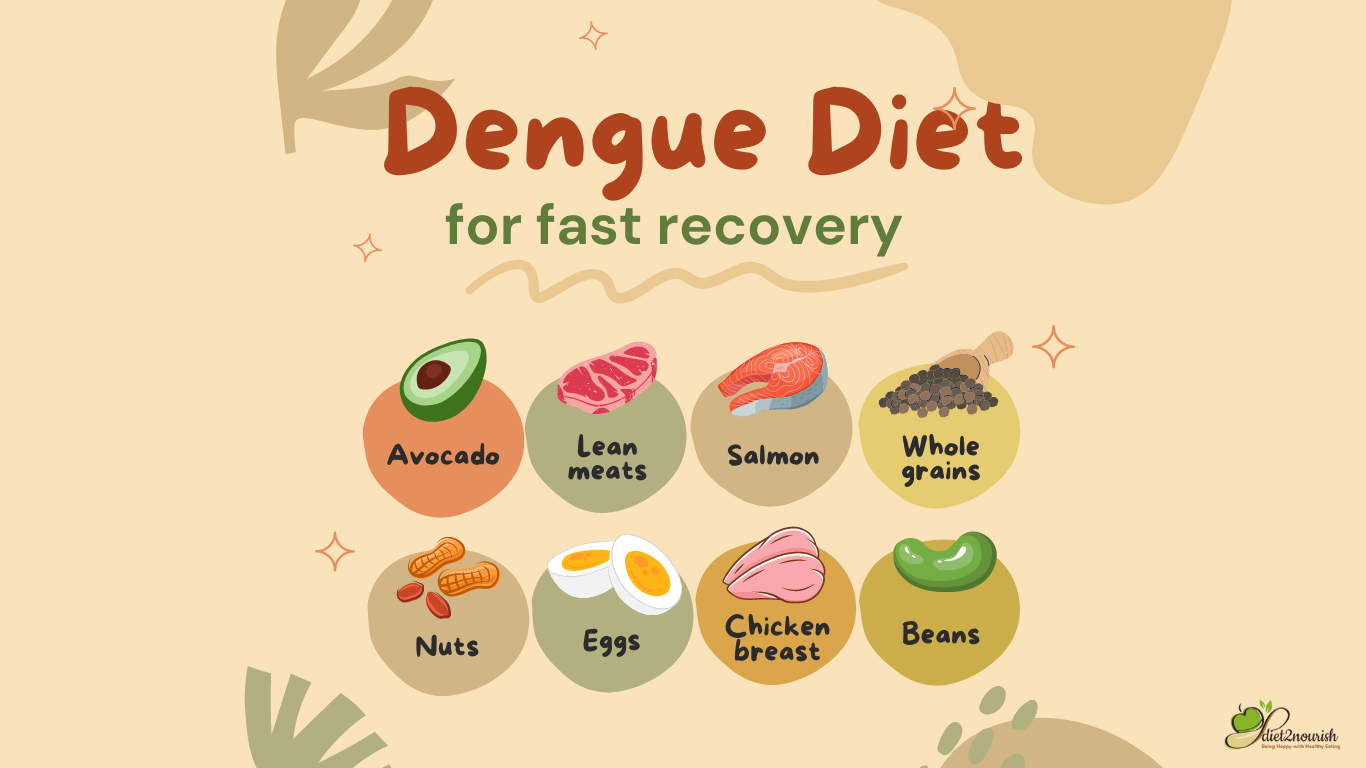Dengue Diet
Dengue Diet – Dengue is regarded as a highly dangerous kind of fever, which is spread by a category of mosquitos, usually found in clean water. Dengue fever leads to high fever, and in most patients, the fever also accompanies acute pain in the bones and joints. It also leads to loss of appetite and taste, and you can see small spots appearing on the chest, accompanied by nausea and vomiting. Your diet can play a pivotal role in the recovery process from dengue. The right Dengue Diet can aid you with relief from the troublesome symptoms and faster recovery. While we are yet to get any permanent cure for dengue, adapting to a healthy eating plan can be a great help in stabilizing our health and stopping the platelet count from dropping further.
Food for Dengue Patient

Here is a list of some of the best foods for dengue that you should have to control the risk of infection, and keep you protected, healthy, and strong.
Papaya leaf
The juice of papaya leaf is one of the best foods to increase platelet count in a patient suffering from dengue fever. The leaf extract is blessed with valuable enzymes called papain and chymopapain, which support better digestion, stop bloating, and prevent other digestive disorders. It also aids in stronger immunity.
Garlic
Garlic is perhaps the best-in-class anti-viral food that you can ever find. Used mostly in all households, garlic enhances our immunity, and helps us deal with inflammation, sore throat, and even fevers. The antimicrobial and antifungal benefits of garlic fight bad germs and toxins in our bodies and spruce up the recovery process.
Neem leaves
Neem has been regarded since ancient times for its numerous medicinal benefits. As far as dengue is concerned, consuming neem leaves can help in stopping the growth and spread of the dengue virus. It is one of the best dengue treatment foods.
Coconut water
Coconut water is highly recommended during dengue to avoid any chances of dehydration. Loaded with electrolytes and vital nutrients, coconut water is a must in any diet for dengue patients.
Yogurt
Yogurt is essential for digestion and also keeps our immune system functioning well. With probiotic qualities, yogurt aids the production of essential gut bacteria, and eliminates toxins from the body, along with many other health benefits.
Broccoli
Broccoli is a must in the list of foods to increase platelet count in a patient if you observe a sharp decline in your platelet count. It is an excellent source of Vitamin K, which helps regenerate blood platelets. Broccoli is also a rich resource of antioxidants and minerals, that our body needs the most when we have dengue.
Fenugreek
Fenugreek acts as a mild tranquilizer and induces sleep, thus easing pains, which you might experience if you are down with dengue. It also helps stabilize dengue fever.
Spinach
Spinach is rich in iron and omega3 fatty acids, which help improve our immunity and aids in increasing the platelet count.
Turmeric
Another natural remedy, turmeric acts as a great antiseptic and boosts our metabolism. It aids in faster recovery from dengue.
Porridge
Porridge is the most popular breakfast food all over the world. It is called ‘dalia’ in India. Porridge is loaded with numerous minerals and vitamins that keeps us protected from viruses and infections.
Dairy and dairy products for dengue patient
Milk, butter, cheese, and yogurt are some of the best available protein sources that fights the virus and aids in speedy recovery.
Leafy greens
Vitamins and minerals are much needed by our bodies when we are fighting dengue. Leafy greens like kale, spinach, and collard are rich in antioxidants, and vitamins that ensures our immune system stay strong and also increases the hemoglobin.
Food to avoid for dengue patient

As there are foods that aid in faster dengue recovery, there are also some foods that you should avoid to keep your recovery under control.
1. Fried an oily food
Fried and oily foods are loaded with saturated and trans fats that can weaken your immune system and obstruct the process of recovery from dengue. Also, such foods lead to high cholesterol and high blood pressure.
2. Spicy and acidic foods
Spicy foods are a big no for all dengue patients. It leads to acid collection in your tummy, damaging the stomach walls and leading to an ulcer. Such damages can hinder your recovery process.
3. Certain vegetables
Vegetables like cabbage, turnip, and capsicum should be avoided when in dengue as these vegetables can cause gas and swelling in your body.
4. Non-vegetarian foods
Non-vegetarian foods gain a strict no if you are suffering from dengue. Strict to a vegetarian diet, and increase your fluid intake for better and faster recovery.
5. Beverages
Avoid drinking aerated drinks and especially caffeinated beverages. These drinks can cause rapid heart rate, and bring in fatigue, leading to muscle breakdowns.
Fruits for dengue patient
With dengue fever, you need good rest, care, and proper nutrition to fight the disease and recover faster. Here is a list of certain fruits that you should include in your dengue diet:
Pomegranates
Laced with minerals and other essential nutrients, pomegranates provide us with the much-needed energy our body needs during dengue fever. It helps reduce exhaustion and fatigue. The rich content of iron in pomegranates is also very beneficial for our blood – helps maintain platelet count and speeds up the recovery process.
Oranges
Loaded with the richness of vitamin C and antioxidants, oranges help fight and treat dengue. Vitamin C is also vital for our body’s immunity.
Grapefruit
Grapefruit is not only good to taste but also rich in valuable nutrients. Packed with vitamin C and antioxidants, grapefruits can recharge our immune system, relieve fever, and boost the production of WBCs (known to fight infections) in our bodies.
Kiwifruits
Kiwifruits contain good volumes of potassium, vitamin A, and vitamin E that balances our body’s electrolytes, thereby limiting hypertension and blood pressure. Kiwifruits also have copper which aids the formation of healthy red blood cells and builds immunity against diseases.
Papaya
Papayas are good sources of fibers, zinc, folate, and vitamins. Adding it to our daily diet can help increase platelet count, and WBCs, heal wounds and prevent blood from a clot. Drinking papaya juice when you have dengue will ensure that your platelet count does not fall.
Melons
The high-water content in melons ensures that you are never dehydrated and the body gets enough minerals to fight dengue.
Diet chart for dengue patient
The side effects of dengue are devastating. Diet plays an important role in the process to fight and recover from the illness. Here is a sample detailed diet chart for dengue patient:
Early Morning:
Begin your day with a fresh juice like aloe vera or amla empty stomach.
For Breakfast:
Go for some easy-to-digest food options like upma or poha or porridge or a brown bread veg sandwich.
Pre-Lunch:
An hour or two before your lunch, go for some coconut juice or giloy juice or some papaya leaves juice.
For Lunch:
Get some homemade food like dal with rice or chapati, some steamed or mildly cooked vegetables, and a cup of yogurt.
Evening:
Avoid eating anything in the evening. Go for some juice or ginger tea.
Pre-Dinner:
Get some soup like vegetable or tomato soup.
For Dinner:
It is always better to opt for some easy-to-digest foods for dinner. Eat some Dalia, or kichdi, or a cup of dal with some steamed vegetables.
Before Bedtime:
Drink a glass of goat milk with some turmeric in it. It helps boost your immune system.
Nutritional needs
During this condition you should consume food that will be rich in protein and iron. They are meat, eggs, liver etc. These kinds of foods will combat dengue fever and you will get fast recovery. A body that is well-nourished is always the best to combat a dengue infection.
Frequently Asked Questions (FAQs)
Proteins are needed in higher quantities when you are suffering from dengue. It helps recovery faster and aids in retaining the nutrients lost. Eggs, chicken, fishes, dairy, and dairy products are great sources of proteins.
Also drinking plenty of fluids during dengue is good to stay hydrated and maintain water and electrolyte balance of the body. Milk is energy-dense food that helps retain body energy and regain strength after the energy loss due to the infection.
Guava Juice: rich in vitamin C, guava juice helps in the production of platelets and strengthens the body’s immune system.
Papaya Leaf Juice: The leaf extract is blessed with valuable enzymes called papain and chymopapain, which support better digestion, stop bloating, and prevent other digestive disorders. It also aids in stronger immunity.
Vegetable Juices: Vegetables are rich in essential nutrients that provide our body with the right nourishment it needs. It keeps our immune system strong and aids in faster recovery.
Neem Leave Juice: the juice of neem leaves can help in stopping the growth and spread of the dengue virus.
Add at least two to three Basil Leaves in your dengue diet. They have natural immune-boosting properties. You should focus on drinking electrolytes salts for fast recovery. A fruit salad of dengue friendly fruits is a great option. You can add kiwi, pomegranate and other fresh fruits and veggies to it. In addition, you can drink goat milk for best results. It is one of the best home remedies to treat dengue fever at home.
First and foremost, Stay Hydrated! You should Drink plenty of fluids. Drink it as water, coconut water, or herbal teas. Always remember to rest well! Your body needs energy to fight off the virus. So, get plenty of sleep. And you must avoid any energetic activities. Focus on eating a Balanced Diet. It must have fruits, vegetables, and lean proteins. Avoid processed foods. Once recovered, you should exercise daily. It can help strengthen the immune system. Other than this, you must use mosquito nets and repellents. It can help prevent further infections.







